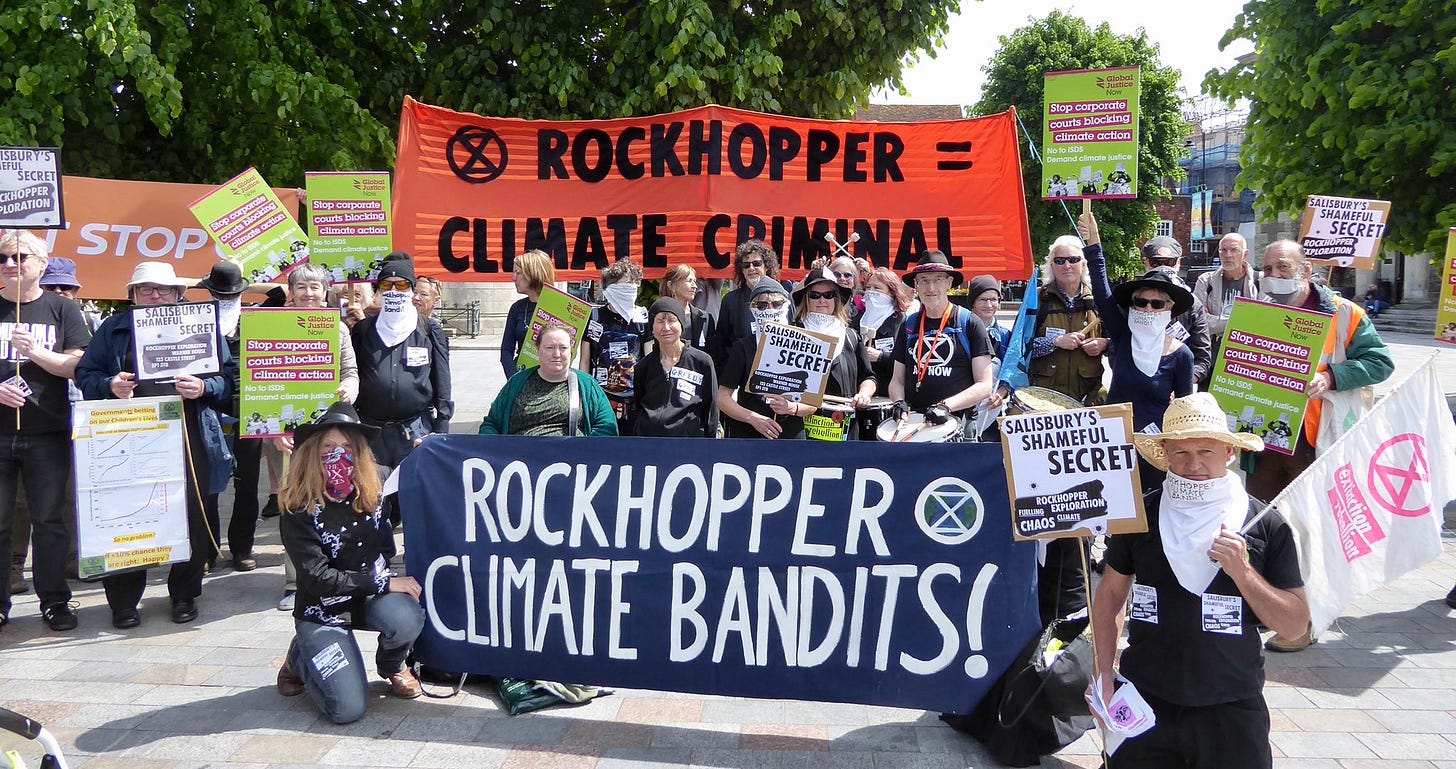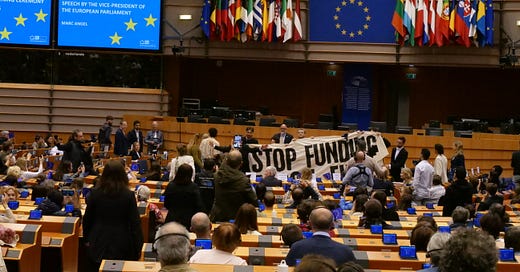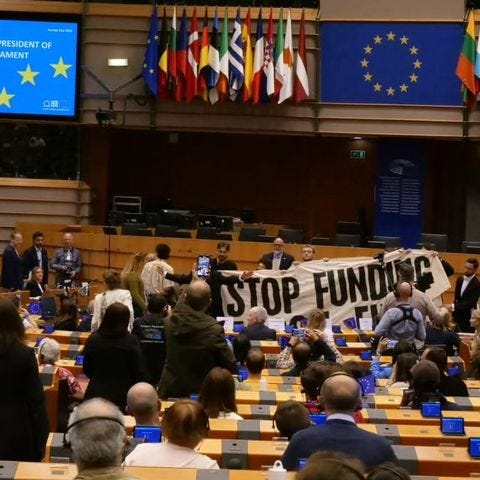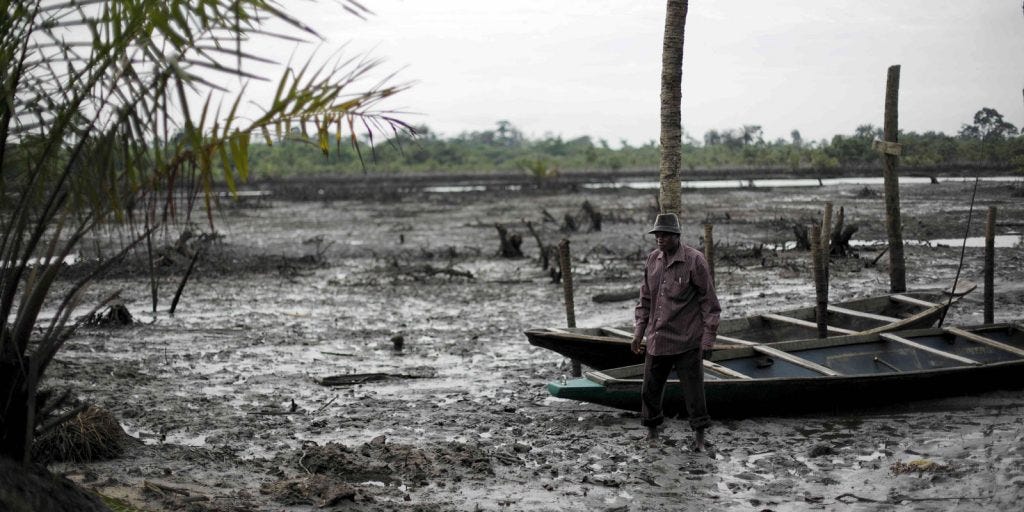I got arrested for holding a banner protesting EU fossil fuel investments
Jail isn't as scary as climate inaction.
“How should I tell this story?” I said, talking to distract myself from the cold. “I don’t want to scare people off from joining climate protests.”
My cellmate said, “Tell them it’s OK if you are in good company.”
The next day, my dad called me. Maybe you shouldn’t say too much about it publicly, he said, in case it’s used against you in legal proceedings.
Maybe. But I’ve never been good at being afraid of the consequences of my actions. The consequences of inaction and silence, on the other hand, scare me a lot.
On Saturday morning I joined a peaceful protest with a group of activists from the Federation of Young European Greens and other groups. We entered the European Parliament on an open day and interrupted a talk to hold a banner that said ‘Stop Funding Fossil Fuels.’
Between 2008 and 2019 EU Member States provided €55 to 58 billion per year of explicit subsidies for fossil fuels. From 2015 to 2019, the expenditure increased.
“We will end new direct public support for the international unabated fossil fuel energy sector within one year of signing this statement. We recognise… investing in unabated fossil-related energy projects increasingly entails both social and economic risks.”
Glasgow Statement signed by several EU states, COP26, 2022.
After holding up the banner in the Parliament, we were escorted outside by the Parliament security, who told us to give our IDs now and that we would be banned from entering the building - possibly forever. Soon after, around 20 police officers arrived. I was searched, hands against the wall.
“I’m a woman,” said the police officer, “So it’s OK.”
One of the activists tried to write down the number of our on-call lawyer on his arm. The officers prevented him. They handcuffed us and a van pulled up. (A police ride to a mysterious building in outer Brussels is quicker and cheaper than using the national public transport system).
The emissions from burning oil and gas produced by Shell, BP, TotalEnergies, ExxonMobil and Chevron until 2050 could cause an estimated 11.5 million additional premature deaths due to heat before the end of the century.
“The [European] Commission shall adopt implementing acts to set out the structure, format, technical details and methodology for the reporting, including on the phasing out of energy subsidies, in particular for fossil fuels.” European Climate Law, 2021.
Without being told the reasons for our arrest, the men and woman were split up and put in concrete cells with no heating (and non-binary members had to ‘decide’ in order to avoid total isolation). The cells were littered with empty waterbottles and the graffiti of previous protestors. XR stickers peeled off the walls. The officers gave us a plastic-wrapped waffle each - generously described as our legal meal - and told we would be there until 6pm.
“Will we have more food before then?” one of my cellmates said.
“We are not a restaurant,” said the guard.
I thought about the previous week, when my laptop and work was stolen in central Brussels. The police never showed up because they were too busy. I wonder if they were busy dealing with other serious banner-holding criminals like me.
I would feel pretty disillusioned if I joined the police to make the city safer and ended up guarding activists instead.
In 2023, the big five fossil fuel companies (Shell, BP, Chevron, ExxonMobil and TotalEnergies) paid shareholders a record $111 billion. This figure is some 158 times what was pledged to vulnerable nations at last year’s COP28 climate summit.
Meanwhile, nearly 1 in 10 EU citizens were unable to afford to heat their homes over the winter.

We asked for a toilet break. The guards, who first pretended not to hear us, then told us it wasn’t a good moment.
“When are we going home?”
They told us it would be 8pm. We pointed out earlier they said 6pm.
The guard shrugged. “We are very busy. We have to process maybe 200 Extinction Rebellion protestors soon. We will probably let you go after that.”
Eventually they started releasing us around 7pm. I went into an office - finally, somewhere warm - where they were looking everywhere for my ‘paper’ that was meant to accompany my belongings.
“Um,” I said. “If it’s the thing I’m meant to sign to agree to the terms of my arrest, I never got given one to sign.”
After a long and awkward pause, the officer sighed. Told the other guard to let me go. He escorted me out and I was put into another van, along with the others.
“They are going to drop us somewhere in Brussels,” one of them told me. At 8pm, we finally left.
Inclusiveness is democracy's strength. When people across all generations are able to use their freedoms and rights to participate and engage in their societies, they can push back against authoritarianism. We are determined to protect the democratic institutions that underpin our democracy. European Parliament statement, September 2023.
This police overreaction is a scare tactic. You only need tactics for things that pose a significant threat. So I think we must be pretty scary to the people in charge (fossil fuel lobbyists, who have the greatest influence of all lobby groups in the EU).
Rather than fearing the consequences of holding a banner and repeating the EU’s own climate commitments back to them, I worry about the consequences if we don’t. They can’t stop us all - no really, they released us because they were running out of space to put all the Extinction Rebellion protestors - and really, what well-functioning democracy would want to?
Ending fossil fuel subsidies has direct and immediate universal benefits. It frees up millions of euros for investment in clean and affordable energy, green spaces, green jobs, healthcare, education and funds for loss and damage and supporting a global just transition.
It begins to tackle the devastatingly unequal and neocolonial fossil fuel-dominated economy and build a society where we can aspire to do better than just ‘offset’ the impact of our existence.
Imagine if the European Union responded to climate breakdown with the same urgency and speed they reacted to a group of young activists. What could we do if we put the wealth, time and power to do good?
How else can I possibly justify spending my time? If not on this, then on what? If not now, then when?
“What we eat here is pure poison. People who can, leave here… But some don’t have that choice… Sometimes I take my children to the river to tell them stories about how beautiful it was here. But actually, I shouldn’t do that. The air you breathe here is too polluted.”
Veronica Adda Kobani from the Nigerian village of Goi. Western fossil fuel companies have been extracting oil from the region for decades. Clean-up is estimated to take 30 years.
Press release of arrest and protest on the FYEG website, with photos and videos available.
Our content is free but our work shouldn’t be. If you can spare a euro, donations go to keeping The Green Fix and its events running.
What’s Going On?
Financial Times and Reuters pull Saudi Aramco-sponsored climate content.
Related: Attacks on environmental journalists growing worldwide, UN study finds.BNP Paribas must face lawsuit over Sudanese genocide, US judge rules.
Related: BP was warned gas-driven climate change could cause ‘unprecedented famine,’ launches new pro-gas campaign.4 in 10 ‘sustainable’ funds invest in fossil fuel companies.
Related: Big oil privately acknowledged efforts to downplay climate crisis, joint committee investigation finds.Double Dehumanisation: the EU borders and Gaza.
Related: Ghent students occupy university building in climate and Gaza protest.Solomon Islands tribes decide to sell carbon credits, not their trees.
Related: Latin America approves plan for protecting environmental defenders.
Focus On… The Massive Loophole Law Fossil Fuel Companies are Using
Alexandra Vazquez-Mera and Cass Hebron talk to Fabian Flues from NGO PowerShift about the Energy Charter Treaty and what the EU’s withdrawal means.
My name is Fabian Flues, I work at PowerShift. We’re a small NGO based in Berlin, Germany.
Our focus lies on two key areas: international trade and investment's effects on the environment and communities, and minerals and mining. For the last 4 years, I’ve been involved in a campaign to persuade countries and the EU to leave the Energy Charter Treaty (ECT).
What is the Energy Charter Treaty?
The Energy Charter Treaty is an international investment agreement from the 1990s. It gives private investors and companies the ability to sue states if states do something that reduces the value of an investment or causes harm in some way to a private company.
It involves around 50 countries, including nearly all EU members plus many countries in Eastern Europe, West Asia, and Central Asia. Private investors can use this mechanism to challenge states, and this can become very costly for countries if they lose those cases.
Are companies actually using this law?
There have been over 150 instances where private investors kicked off cases against states. A lot of these cases involve fossil fuels.
Take the case of a British oil company named Rockhopper, which took legal action against Italy. The company had obtained exploration rights for oil drilling in the Adriatic Sea, but Italy passed a law banning coastal oil drilling due to earthquake and pollution concerns. Rockhopper claimed to have invested around 30 million euros in acquiring these rights. Italy was forced to pay them 250 million euros—eight times the initial investment.

Governments, unsure if they will win, frequently opt to concede to avoid financial consequences. These concessions might mean delaying the shift away from fossil fuels.
How does this affect people? Why should I care?
Everyone who pays taxes should care where their taxes are spent on, and if they're spent on compensating fossil fuel companies for imaginary profits. These funds could be directed towards public services like transportation and healthcare.
Also, it's detrimental to communities directly impacted by energy projects. Companies have been advancing unpopular energy projects by leveraging the threat of ECT claims. For instance, a fracking company is currently suing Slovenia for half a billion euros because they were compelled to conduct an environmental impact assessment.
Another case involves the denial of a permit for a uranium mine in Northern Spain. Local communities fought against the mine, and the company Berkeley, after being denied the permit, now wants to start an ECT claim. Removing the option of using the ECT provides affected communities with a stronger defense against such projects.
Why did the EU sign up to the ECT in the first place?
When the ECT was negotiated, its primary aim was to safeguard the investments of European oil and gas companies in Central Asia following the collapse of the Soviet Union. The goal was to enable companies like Total, Shell, and BP to invest securely in the newly independent nations. At that time, climate change was not a [recognised] significant concern.
European countries thought they would never be sued under the ECT, assuming it was only an instrument against countries with a weak rule of law. But law firms and companies soon discovered that the ECT granted rights surpassing those of most national constitutions or European laws.
Is the EU’s withdrawal from the ECT a victory?
This is definitely a victory, but the process is not yet complete. While the European Parliament has ratified the withdrawal of the EU, the process isn't fully complete until the Council gives its final agreement. We're wary of recent developments in the Council where last-minute changes can happen. It’s a win, but there are two caveats.
Firstly, not all EU member states have agreed to withdraw alongside the EU, mainly due to complex legal reasons and a lack of consensus among member states.
Secondly, the ECT includes a 20-year survival clause, allowing companies to sue countries or the EU for investments made prior to the withdrawal. This clause is undemocratic, as it binds decision-makers for two decades to a treaty they didn’t choose to sign. The EU is striving to limit the scope of this clause.
Does this mean that fossil fuel companies are no longer having a serious influence on EU policy?
The ECT is just one of the many ways that large companies can influence EU policy. It often serves as a last resort. Before resorting to it, companies usually employ lobbying tactics and collaborate with industry associations to influence favorable government policies. The influence of fossil fuel companies won't disappear because of the exit from the ECT.
Treaties like the ECT were originally invented by European countries to be used against nations predominantly in the Global South. It's less likely that a company from Burkina Faso is going to start a case against Germany because they don't invest in Germany, while the other way around happens regularly. We're talking about it a lot more in Europe because the ECT, in particular, has generated many cases against European countries, and that's why there was a feeling that there was a need for action. That feeling might disappear now.
It’s crucial not to abandon efforts to dismantle this unjust system now, when the threat to EU policy or European countries has disappeared.
You can follow PowerShift on X, Instagram or LinkedIn.
So Now What Do I Do?
LEARN SOMETHING
Join The Green Fix and Idealists Quarterly for a Fuck-Up Night! In Brussels on the 21st May at 19:00 CEST. Tickets available, between €4-€8.
Gen Z activists are invited to a Zoom workshop on burnout and self-care on 17 May. US timezone, discussion and slides will be shared afterwards.
Check out this cool interactive storybook following the lives of four girls around the world and two possible paths for their futures.
TRY SOMETHING NEW
Tune into the launch of the EU Ecofeminist Scorecard, organised by WECF, an ecofeminist network organisation. 8 May at 15:00 CEST.
The European Climate Foundation is offering workshops for projects boosting the energy transition from the Mediterranean region. Deadline 12 May.
Join the International Days of Action from 31 May to 2 June with this online toolkit!
CHANGE THE SYSTEM
The UN Human Rights Office is looking for new Youth Advisory Board members aged 18-30. Apply before 13 May.
The EU-Council of Europe Youth Partnership is looking for participants for a September symposium on young people, democracy and climate action. Apply by 20 May.
Registration is open for the online ClientEarth Summit taking place 4-6 June!
The Green Fix is now offering low-cost sponsored slots on the newsletter. Book your slot by emailing wearethegreenfix@gmail.com.
Stay in the loop
You can follow us on Twitter @TheGreenFix, Instagram @thegreenfix_ and LinkedIn. Connect with Cass on Instagram @cass.hebron and LinkedIn Cass J Hebron.










My endless respect! 🫡